人教版九年级全册Unit 1 How can we become good learners?SectionB 1a–1e 课件(共25张PPT)
文档属性
| 名称 | 人教版九年级全册Unit 1 How can we become good learners?SectionB 1a–1e 课件(共25张PPT) | 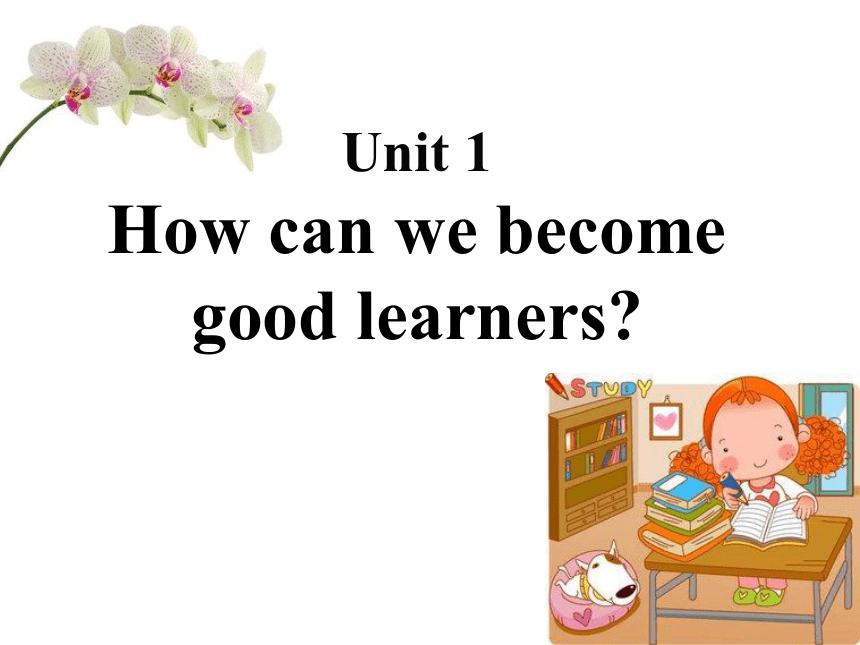 | |
| 格式 | ppt | ||
| 文件大小 | 2.4MB | ||
| 资源类型 | 教案 | ||
| 版本资源 | 人教新目标(Go for it)版 | ||
| 科目 | 英语 | ||
| 更新时间 | 2022-11-12 18:39:21 | ||
图片预览



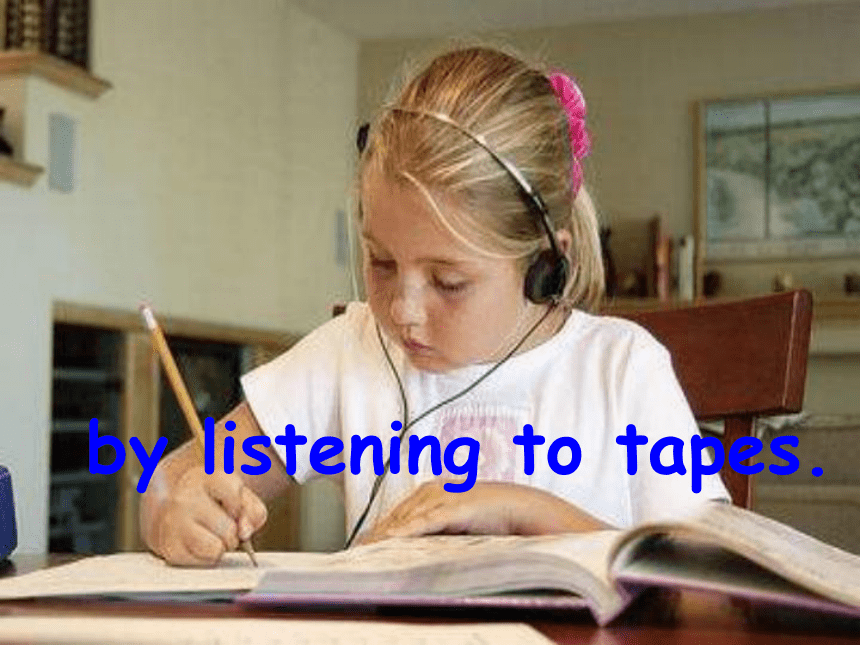
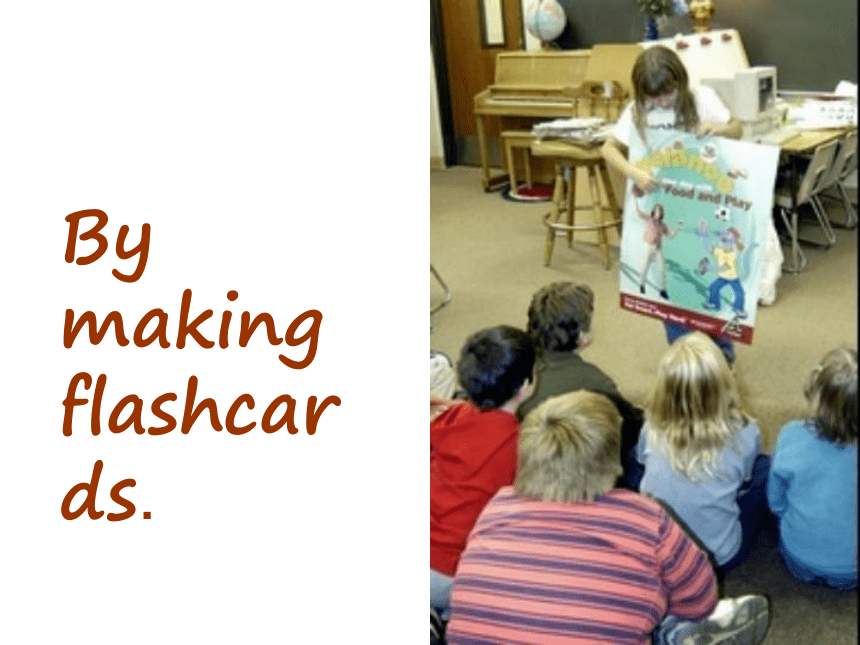
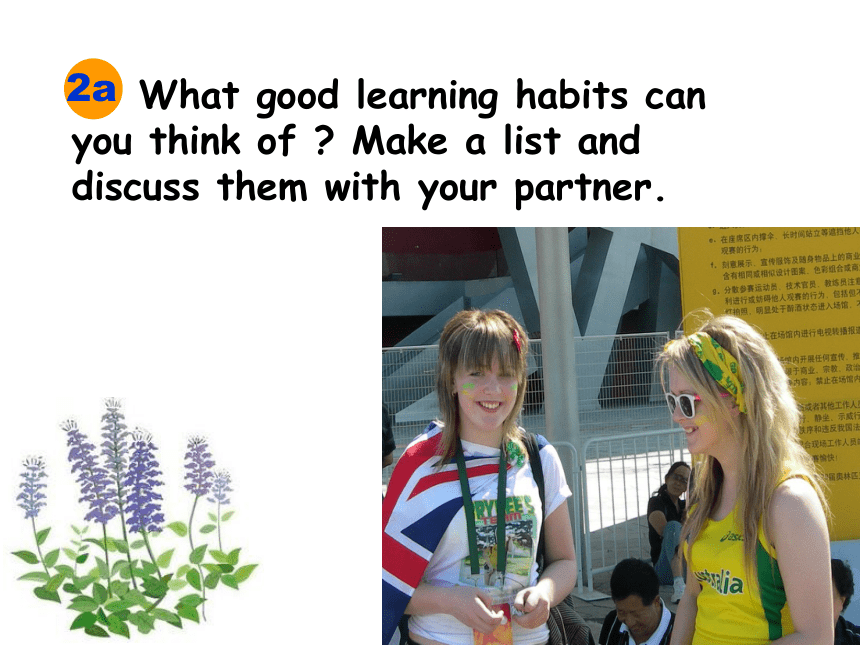
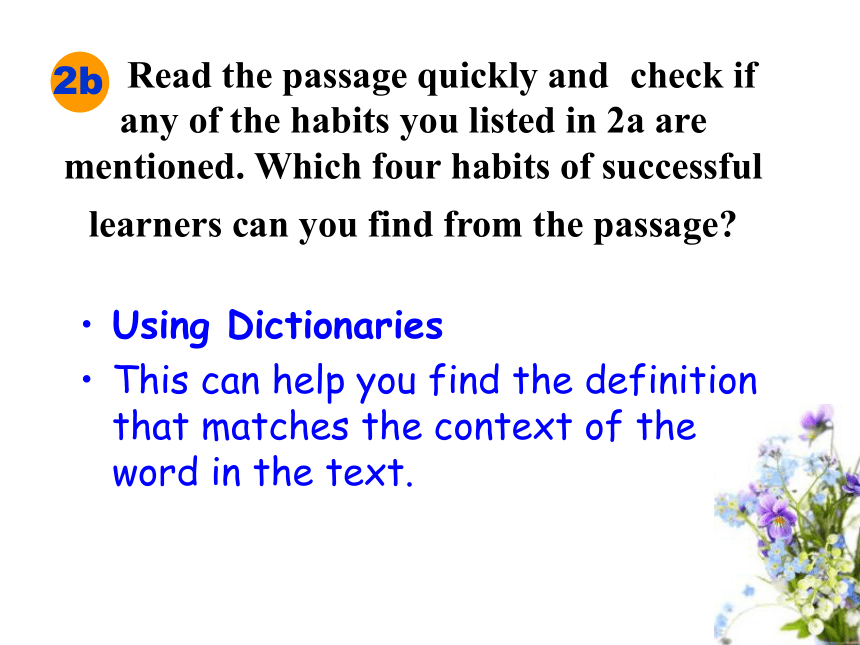
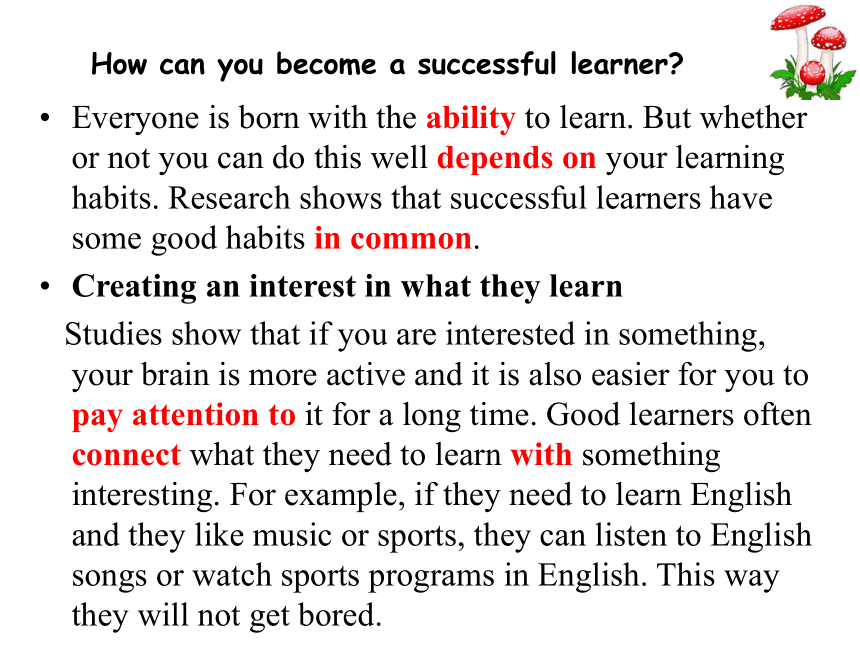
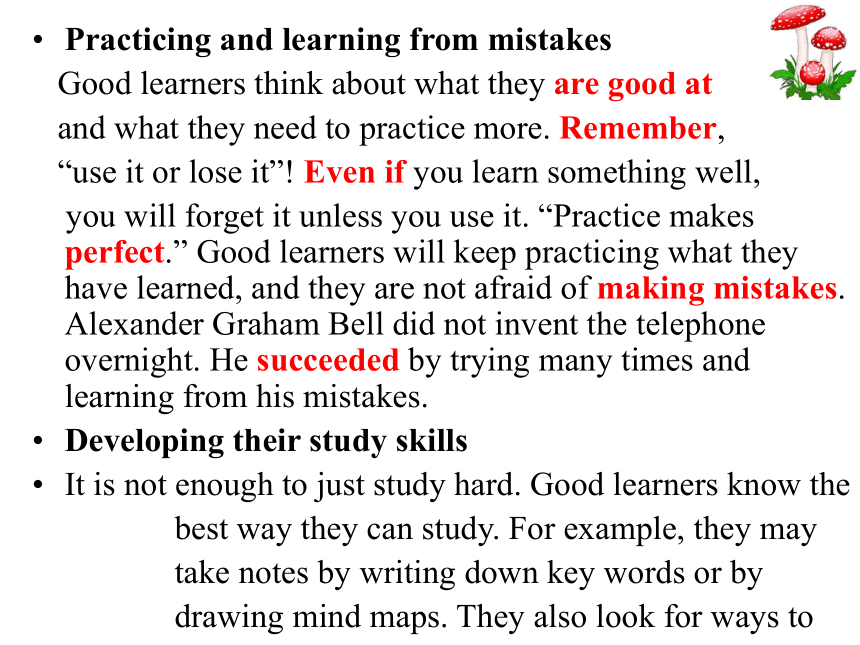
文档简介
(共25张PPT)
Unit 1
How can we become good learners
What good learning habits can you think of
By working with friends
by listening to tapes.
By making flashcards.
What good learning habits can you think of Make a list and discuss them with your partner.
2a
Read the passage quickly and check if
any of the habits you listed in 2a are mentioned. Which four habits of successful learners can you find from the passage
Using Dictionaries
This can help you find the definition that matches the context of the word in the text.
2b
How can you become a successful learner
Everyone is born with the ability to learn. But whether or not you can do this well depends on your learning habits. Research shows that successful learners have some good habits in common.
Creating an interest in what they learn
Studies show that if you are interested in something, your brain is more active and it is also easier for you to pay attention to it for a long time. Good learners often connect what they need to learn with something interesting. For example, if they need to learn English and they like music or sports, they can listen to English songs or watch sports programs in English. This way they will not get bored.
Practicing and learning from mistakes
Good learners think about what they are good at
and what they need to practice more. Remember,
“use it or lose it”! Even if you learn something well,
you will forget it unless you use it. “Practice makes perfect.” Good learners will keep practicing what they have learned, and they are not afraid of making mistakes. Alexander Graham Bell did not invent the telephone overnight. He succeeded by trying many times and learning from his mistakes.
Developing their study skills
It is not enough to just study hard. Good learners know the
best way they can study. For example, they may
take notes by writing down key words or by
drawing mind maps. They also look for ways to
review what they have learned. They may do this by reading their notes every day or by explaining the information to another student.
Asking questions
Good learners often ask questions during or after class. They even ask each other and try to find out the answers. Knowledge comes from questioning.
Learning is a lifelong journey because every day brings something new. Everything that you learn becomes a part of you and changes you, so learn wisely and learn well.
语法重点一
(1)whether or not意为“是否;该不该”。
如:I don’t know whether or not to believe him.
(2)depend on意为“依赖;依靠;取决于;随...而定。”
如:Children depend on their parents for food and
clothing.
It all depend on whether she like the boss or not.
I've been old enough to shift for myself I'll
no longer depend on my father.
in common意为“共同的,共有的”,该短语通常与have,use等动词搭配,位于这些及物动词的宾语之后(如:have sth. in common在某方面有共同特征),在被动句中,则紧接上述动词之后,在句中通常作状语或定语。
如:I have nothing in common with Jane.
The swimming pool is used in common by all the children in the neighbourhood.
The two cultures have a lot in common.
语法重点二
pay attention to意为“注意;留意”,这里的to是一个介词,并不是动词不定式。所以,这个短语后面要接动词的话,要用动名词形式。
如:You must pay attention to your teacher in the class.
I hope you will pay attention to this problem.
You must pay attention to your study.
语法重点三
notice和pay attention to 有什么区别
connect 作动词,意为“连接;联合;关连”。
如: I cannot connect the two things in my mind.
connect with意为“和……有关,和……有联系”, 也可以这样用:connect sth./sb with sb./sth.。
如: He is connected with the murder.
【辨析】connect to 与connect with的区别
connect to 的意思是 把……连接到…….。
如: Please connect the computer to Internet.
connect with是和……有关,和……有联系.
如: He is connected with the case.
语法重点四
语法重点五
think about意为“考虑”。
如:He is thinking about emigrating to Canada.
Think about what we should do tomorrow.
[拓展]①think of意为“想到;对……有想法”。
如:You think of everything.
②think over意为“反复思考”。
如:I’d like more time to think things over.
语法重点六
be good at意为“擅长”。
如:A good listener must be good at asking questions.
I am good at English.
[拓展] be good with 灵巧的;与……相处得好 be good to 对……友好
be good for 对……有好处
Read the passage again and answer the questions.
Does the writer think that everyone is born with the ability to learn well Do you agree Why or why not
2c
The writer doesn't think that everyone is born with the ability to learn well. I agree with the writer that everyone is born with the ability to
learn, but learning well depends on the
learning habits that one develops.
2. Why is it a good idea to connect
something you need to learn with
something you are interested in
2c
This is because studies show that if you are interested in something, your brain is more active and it is easier for you to pay attention to it for a long time. You will also not get bored.
3. What do the sayings “Use it or
lose it” and “Practice makes perfect”
mean Do you agree with them
2c
Use it or lose it: If you stop doing something, you will forget how to do it.
Practice makes perfect: If you do something again and again, you will become very good at it.
4. Do good learners learn from mistakes, or are
they afraid of making mistakes
2c
They learn from mistakes, and they are not afraid of making mistakes.
5. What study skills does the writer talk
about Do you have those study skills
6. Do you agree that learning is a lifelong journey Why or why not
2c
Take notes by writing down key words or by drawing mind maps.
Look for ways to review what has been learnt, eg. read the notes every day or explain the information to another student.
Answers will vary.
Look up the following words from the passage in the dictionary. Then write a sentence for each word.
brain n. connect v overnight adv.
attention n. review v. knowledge n.
ability n. active adj. wisely adv.
2d
eg: She has the ability to do the job.
Pay attention to the stress of the word.
Before the examination we have a review
of the term's work.
Discuss
Do you think you are a good learner What learning habits do you think are useful Discuss with your group and share your ideas with the class.
2e
1. The child's reading ________ was great.
ability B. capability C. capacity D. talent
2. Shall we go for a picnic tomorrow
--- Well, it all _______ the weather.
A. belongs to B. happens to C .depends on D. concentrate on
3. When you visit a museum you
should _________ the instructions and don’t be against
them.
A. compare with B. look forward to
C. pay attention to D. try out
A
C
C
小结训练
Unit 1
How can we become good learners
What good learning habits can you think of
By working with friends
by listening to tapes.
By making flashcards.
What good learning habits can you think of Make a list and discuss them with your partner.
2a
Read the passage quickly and check if
any of the habits you listed in 2a are mentioned. Which four habits of successful learners can you find from the passage
Using Dictionaries
This can help you find the definition that matches the context of the word in the text.
2b
How can you become a successful learner
Everyone is born with the ability to learn. But whether or not you can do this well depends on your learning habits. Research shows that successful learners have some good habits in common.
Creating an interest in what they learn
Studies show that if you are interested in something, your brain is more active and it is also easier for you to pay attention to it for a long time. Good learners often connect what they need to learn with something interesting. For example, if they need to learn English and they like music or sports, they can listen to English songs or watch sports programs in English. This way they will not get bored.
Practicing and learning from mistakes
Good learners think about what they are good at
and what they need to practice more. Remember,
“use it or lose it”! Even if you learn something well,
you will forget it unless you use it. “Practice makes perfect.” Good learners will keep practicing what they have learned, and they are not afraid of making mistakes. Alexander Graham Bell did not invent the telephone overnight. He succeeded by trying many times and learning from his mistakes.
Developing their study skills
It is not enough to just study hard. Good learners know the
best way they can study. For example, they may
take notes by writing down key words or by
drawing mind maps. They also look for ways to
review what they have learned. They may do this by reading their notes every day or by explaining the information to another student.
Asking questions
Good learners often ask questions during or after class. They even ask each other and try to find out the answers. Knowledge comes from questioning.
Learning is a lifelong journey because every day brings something new. Everything that you learn becomes a part of you and changes you, so learn wisely and learn well.
语法重点一
(1)whether or not意为“是否;该不该”。
如:I don’t know whether or not to believe him.
(2)depend on意为“依赖;依靠;取决于;随...而定。”
如:Children depend on their parents for food and
clothing.
It all depend on whether she like the boss or not.
I've been old enough to shift for myself I'll
no longer depend on my father.
in common意为“共同的,共有的”,该短语通常与have,use等动词搭配,位于这些及物动词的宾语之后(如:have sth. in common在某方面有共同特征),在被动句中,则紧接上述动词之后,在句中通常作状语或定语。
如:I have nothing in common with Jane.
The swimming pool is used in common by all the children in the neighbourhood.
The two cultures have a lot in common.
语法重点二
pay attention to意为“注意;留意”,这里的to是一个介词,并不是动词不定式。所以,这个短语后面要接动词的话,要用动名词形式。
如:You must pay attention to your teacher in the class.
I hope you will pay attention to this problem.
You must pay attention to your study.
语法重点三
notice和pay attention to 有什么区别
connect 作动词,意为“连接;联合;关连”。
如: I cannot connect the two things in my mind.
connect with意为“和……有关,和……有联系”, 也可以这样用:connect sth./sb with sb./sth.。
如: He is connected with the murder.
【辨析】connect to 与connect with的区别
connect to 的意思是 把……连接到…….。
如: Please connect the computer to Internet.
connect with是和……有关,和……有联系.
如: He is connected with the case.
语法重点四
语法重点五
think about意为“考虑”。
如:He is thinking about emigrating to Canada.
Think about what we should do tomorrow.
[拓展]①think of意为“想到;对……有想法”。
如:You think of everything.
②think over意为“反复思考”。
如:I’d like more time to think things over.
语法重点六
be good at意为“擅长”。
如:A good listener must be good at asking questions.
I am good at English.
[拓展] be good with 灵巧的;与……相处得好 be good to 对……友好
be good for 对……有好处
Read the passage again and answer the questions.
Does the writer think that everyone is born with the ability to learn well Do you agree Why or why not
2c
The writer doesn't think that everyone is born with the ability to learn well. I agree with the writer that everyone is born with the ability to
learn, but learning well depends on the
learning habits that one develops.
2. Why is it a good idea to connect
something you need to learn with
something you are interested in
2c
This is because studies show that if you are interested in something, your brain is more active and it is easier for you to pay attention to it for a long time. You will also not get bored.
3. What do the sayings “Use it or
lose it” and “Practice makes perfect”
mean Do you agree with them
2c
Use it or lose it: If you stop doing something, you will forget how to do it.
Practice makes perfect: If you do something again and again, you will become very good at it.
4. Do good learners learn from mistakes, or are
they afraid of making mistakes
2c
They learn from mistakes, and they are not afraid of making mistakes.
5. What study skills does the writer talk
about Do you have those study skills
6. Do you agree that learning is a lifelong journey Why or why not
2c
Take notes by writing down key words or by drawing mind maps.
Look for ways to review what has been learnt, eg. read the notes every day or explain the information to another student.
Answers will vary.
Look up the following words from the passage in the dictionary. Then write a sentence for each word.
brain n. connect v overnight adv.
attention n. review v. knowledge n.
ability n. active adj. wisely adv.
2d
eg: She has the ability to do the job.
Pay attention to the stress of the word.
Before the examination we have a review
of the term's work.
Discuss
Do you think you are a good learner What learning habits do you think are useful Discuss with your group and share your ideas with the class.
2e
1. The child's reading ________ was great.
ability B. capability C. capacity D. talent
2. Shall we go for a picnic tomorrow
--- Well, it all _______ the weather.
A. belongs to B. happens to C .depends on D. concentrate on
3. When you visit a museum you
should _________ the instructions and don’t be against
them.
A. compare with B. look forward to
C. pay attention to D. try out
A
C
C
小结训练
同课章节目录
- Unit 1 How can we become good learners.
- Section A
- Section B
- Unit 2 I think that mooncakes are delicious!
- Section A
- Section B
- Unit 3 Could you please tell me where the restroom
- Section A
- Section B
- Unit 4 I used to be afraid of the dark.
- Section A
- Section B
- Unit 5 What are the shirts made of?
- Section A
- Section B
- Review of Units 1-5
- Unit 6 When was it invented?
- Section A
- Section B
- Unit 7 Teenagers should be allowed to choose their
- Section A
- Section B
- Unit 8 It must belong to Carla.
- Section A
- Section B
- Unit 9 I like music that I can dance to.
- Section A
- Section B
- Unit 10 You're supposed to shake hands.
- Section A
- Section B
- Review of Units 6-10
- Unit 11 Sad movies make me cry.
- Section A
- Section B
- Unit 12 Life is full of the unexpected
- Section A
- Section B
- Unit 13 We're trying to save the earth!
- Section A
- Section B
- Unit 14 I remember meeting all of you in Grade 7.
- Section A
- Section B
- Review of Units 11-14
